Business Law Unit 7 Report: Sources, Application and Impact
VerifiedAdded on 2020/12/09
|15
|4895
|95
Report
AI Summary
This report provides a comprehensive overview of business law in the UK, focusing on the sources of law, the role of government in law-making, and the application of statutory and common law in justice courts. It examines the effectiveness of the English legal system, particularly in light of recent reforms. The report also illustrates the potential effects of company, employment, and contract law on businesses. Furthermore, it differentiates between legislation, regulations, and standards. The report explores the legal formation of different types of businesses, analyzes their management and funding, and provides recommendations for resolving business disputes, including an evaluation of legal advice sources. The analysis includes a case study, and the report concludes with a summary of key findings and references.
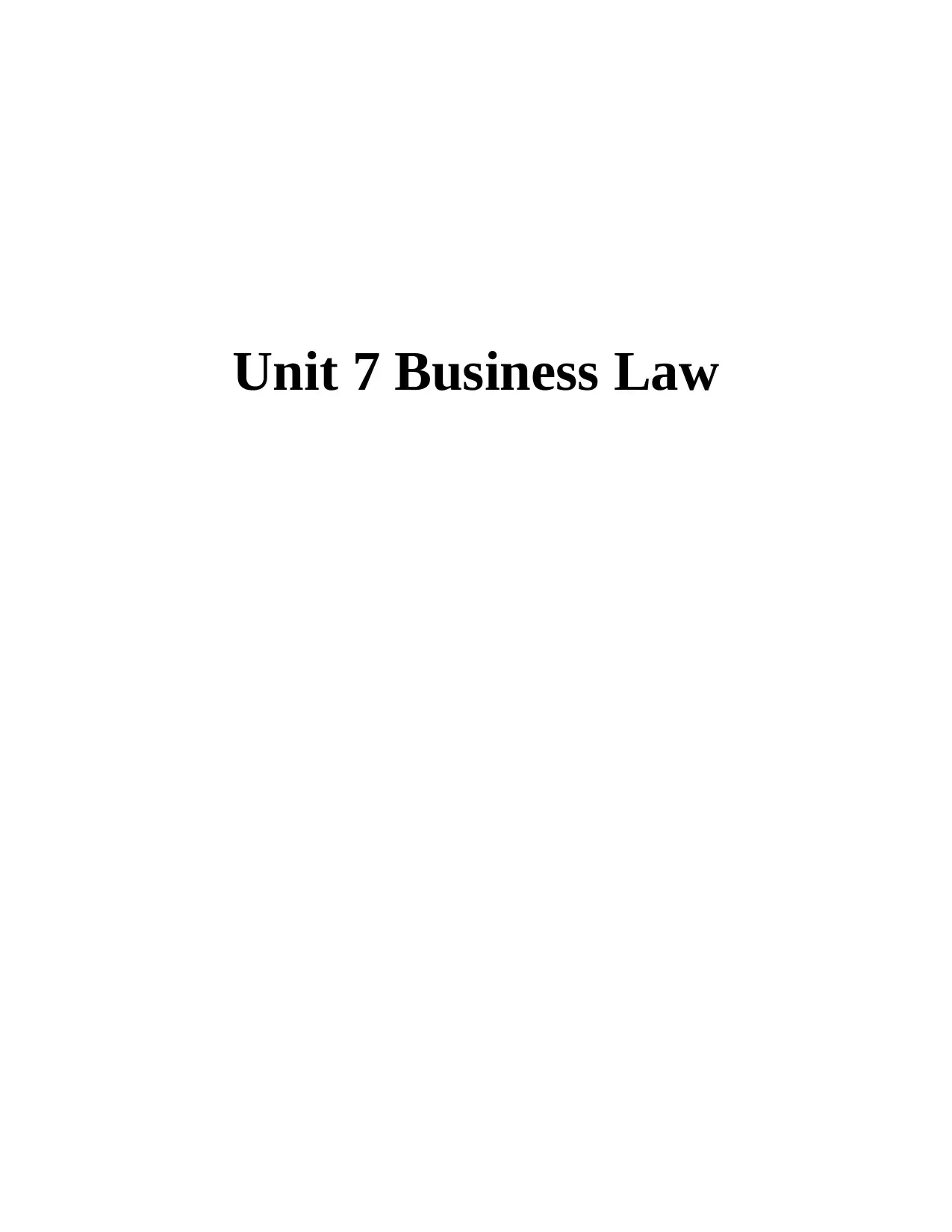
Unit 7 Business Law
Paraphrase This Document
Need a fresh take? Get an instant paraphrase of this document with our AI Paraphraser
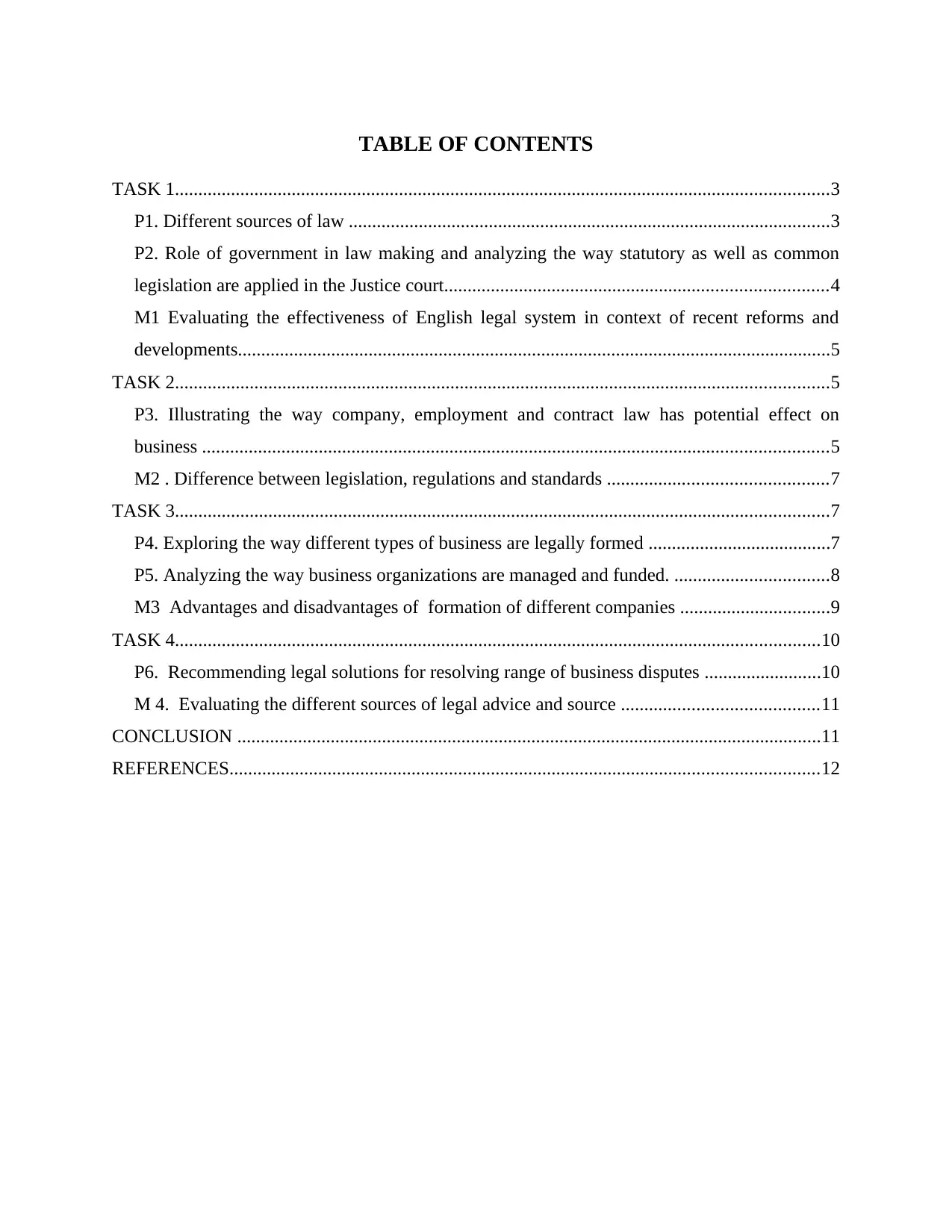
TABLE OF CONTENTS
TASK 1............................................................................................................................................3
P1. Different sources of law .......................................................................................................3
P2. Role of government in law making and analyzing the way statutory as well as common
legislation are applied in the Justice court..................................................................................4
M1 Evaluating the effectiveness of English legal system in context of recent reforms and
developments...............................................................................................................................5
TASK 2............................................................................................................................................5
P3. Illustrating the way company, employment and contract law has potential effect on
business ......................................................................................................................................5
M2 . Difference between legislation, regulations and standards ...............................................7
TASK 3............................................................................................................................................7
P4. Exploring the way different types of business are legally formed .......................................7
P5. Analyzing the way business organizations are managed and funded. .................................8
M3 Advantages and disadvantages of formation of different companies ................................9
TASK 4..........................................................................................................................................10
P6. Recommending legal solutions for resolving range of business disputes .........................10
M 4. Evaluating the different sources of legal advice and source ..........................................11
CONCLUSION .............................................................................................................................11
REFERENCES..............................................................................................................................12
TASK 1............................................................................................................................................3
P1. Different sources of law .......................................................................................................3
P2. Role of government in law making and analyzing the way statutory as well as common
legislation are applied in the Justice court..................................................................................4
M1 Evaluating the effectiveness of English legal system in context of recent reforms and
developments...............................................................................................................................5
TASK 2............................................................................................................................................5
P3. Illustrating the way company, employment and contract law has potential effect on
business ......................................................................................................................................5
M2 . Difference between legislation, regulations and standards ...............................................7
TASK 3............................................................................................................................................7
P4. Exploring the way different types of business are legally formed .......................................7
P5. Analyzing the way business organizations are managed and funded. .................................8
M3 Advantages and disadvantages of formation of different companies ................................9
TASK 4..........................................................................................................................................10
P6. Recommending legal solutions for resolving range of business disputes .........................10
M 4. Evaluating the different sources of legal advice and source ..........................................11
CONCLUSION .............................................................................................................................11
REFERENCES..............................................................................................................................12
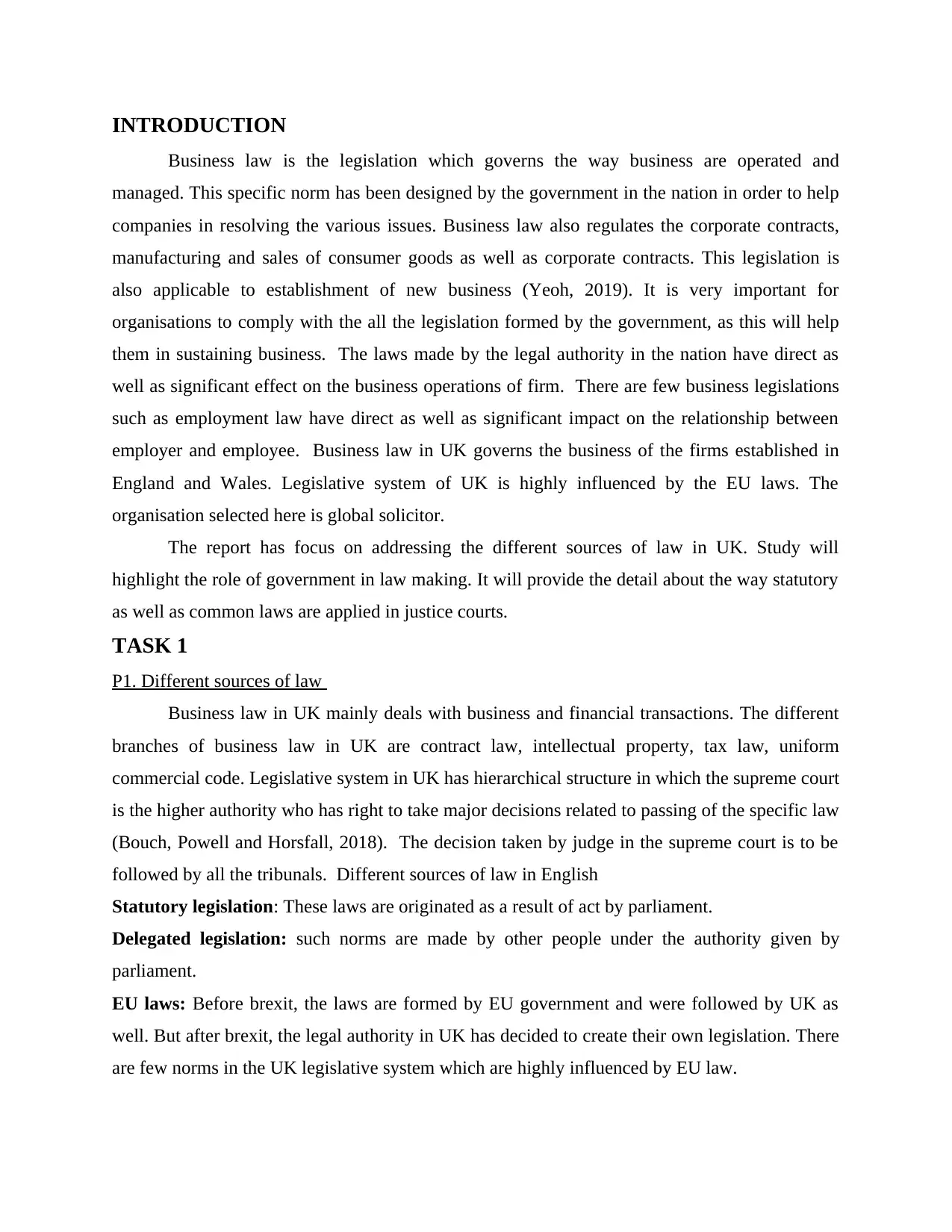
INTRODUCTION
Business law is the legislation which governs the way business are operated and
managed. This specific norm has been designed by the government in the nation in order to help
companies in resolving the various issues. Business law also regulates the corporate contracts,
manufacturing and sales of consumer goods as well as corporate contracts. This legislation is
also applicable to establishment of new business (Yeoh, 2019). It is very important for
organisations to comply with the all the legislation formed by the government, as this will help
them in sustaining business. The laws made by the legal authority in the nation have direct as
well as significant effect on the business operations of firm. There are few business legislations
such as employment law have direct as well as significant impact on the relationship between
employer and employee. Business law in UK governs the business of the firms established in
England and Wales. Legislative system of UK is highly influenced by the EU laws. The
organisation selected here is global solicitor.
The report has focus on addressing the different sources of law in UK. Study will
highlight the role of government in law making. It will provide the detail about the way statutory
as well as common laws are applied in justice courts.
TASK 1
P1. Different sources of law
Business law in UK mainly deals with business and financial transactions. The different
branches of business law in UK are contract law, intellectual property, tax law, uniform
commercial code. Legislative system in UK has hierarchical structure in which the supreme court
is the higher authority who has right to take major decisions related to passing of the specific law
(Bouch, Powell and Horsfall, 2018). The decision taken by judge in the supreme court is to be
followed by all the tribunals. Different sources of law in English
Statutory legislation: These laws are originated as a result of act by parliament.
Delegated legislation: such norms are made by other people under the authority given by
parliament.
EU laws: Before brexit, the laws are formed by EU government and were followed by UK as
well. But after brexit, the legal authority in UK has decided to create their own legislation. There
are few norms in the UK legislative system which are highly influenced by EU law.
Business law is the legislation which governs the way business are operated and
managed. This specific norm has been designed by the government in the nation in order to help
companies in resolving the various issues. Business law also regulates the corporate contracts,
manufacturing and sales of consumer goods as well as corporate contracts. This legislation is
also applicable to establishment of new business (Yeoh, 2019). It is very important for
organisations to comply with the all the legislation formed by the government, as this will help
them in sustaining business. The laws made by the legal authority in the nation have direct as
well as significant effect on the business operations of firm. There are few business legislations
such as employment law have direct as well as significant impact on the relationship between
employer and employee. Business law in UK governs the business of the firms established in
England and Wales. Legislative system of UK is highly influenced by the EU laws. The
organisation selected here is global solicitor.
The report has focus on addressing the different sources of law in UK. Study will
highlight the role of government in law making. It will provide the detail about the way statutory
as well as common laws are applied in justice courts.
TASK 1
P1. Different sources of law
Business law in UK mainly deals with business and financial transactions. The different
branches of business law in UK are contract law, intellectual property, tax law, uniform
commercial code. Legislative system in UK has hierarchical structure in which the supreme court
is the higher authority who has right to take major decisions related to passing of the specific law
(Bouch, Powell and Horsfall, 2018). The decision taken by judge in the supreme court is to be
followed by all the tribunals. Different sources of law in English
Statutory legislation: These laws are originated as a result of act by parliament.
Delegated legislation: such norms are made by other people under the authority given by
parliament.
EU laws: Before brexit, the laws are formed by EU government and were followed by UK as
well. But after brexit, the legal authority in UK has decided to create their own legislation. There
are few norms in the UK legislative system which are highly influenced by EU law.
⊘ This is a preview!⊘
Do you want full access?
Subscribe today to unlock all pages.

Trusted by 1+ million students worldwide
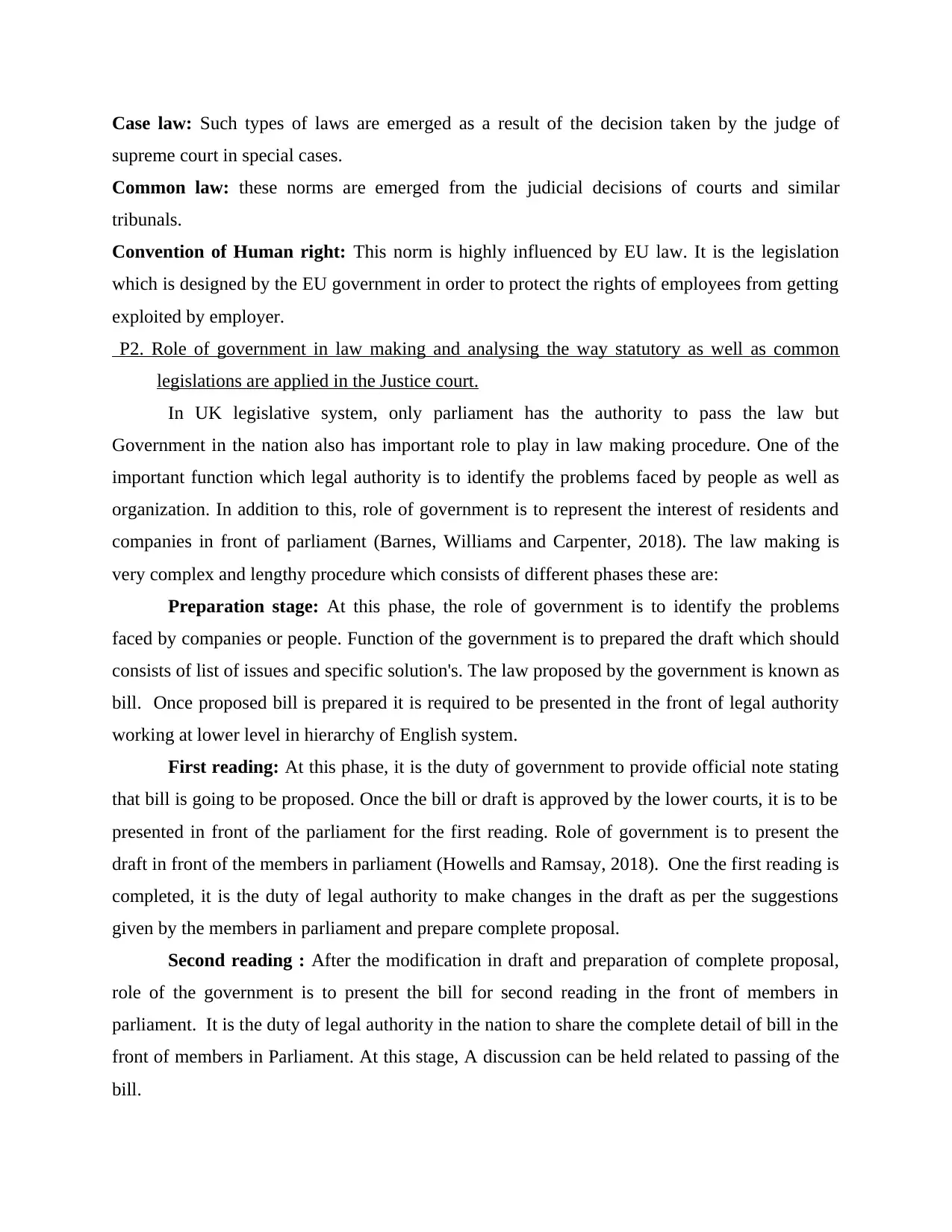
Case law: Such types of laws are emerged as a result of the decision taken by the judge of
supreme court in special cases.
Common law: these norms are emerged from the judicial decisions of courts and similar
tribunals.
Convention of Human right: This norm is highly influenced by EU law. It is the legislation
which is designed by the EU government in order to protect the rights of employees from getting
exploited by employer.
P2. Role of government in law making and analysing the way statutory as well as common
legislations are applied in the Justice court.
In UK legislative system, only parliament has the authority to pass the law but
Government in the nation also has important role to play in law making procedure. One of the
important function which legal authority is to identify the problems faced by people as well as
organization. In addition to this, role of government is to represent the interest of residents and
companies in front of parliament (Barnes, Williams and Carpenter, 2018). The law making is
very complex and lengthy procedure which consists of different phases these are:
Preparation stage: At this phase, the role of government is to identify the problems
faced by companies or people. Function of the government is to prepared the draft which should
consists of list of issues and specific solution's. The law proposed by the government is known as
bill. Once proposed bill is prepared it is required to be presented in the front of legal authority
working at lower level in hierarchy of English system.
First reading: At this phase, it is the duty of government to provide official note stating
that bill is going to be proposed. Once the bill or draft is approved by the lower courts, it is to be
presented in front of the parliament for the first reading. Role of government is to present the
draft in front of the members in parliament (Howells and Ramsay, 2018). One the first reading is
completed, it is the duty of legal authority to make changes in the draft as per the suggestions
given by the members in parliament and prepare complete proposal.
Second reading : After the modification in draft and preparation of complete proposal,
role of the government is to present the bill for second reading in the front of members in
parliament. It is the duty of legal authority in the nation to share the complete detail of bill in the
front of members in Parliament. At this stage, A discussion can be held related to passing of the
bill.
supreme court in special cases.
Common law: these norms are emerged from the judicial decisions of courts and similar
tribunals.
Convention of Human right: This norm is highly influenced by EU law. It is the legislation
which is designed by the EU government in order to protect the rights of employees from getting
exploited by employer.
P2. Role of government in law making and analysing the way statutory as well as common
legislations are applied in the Justice court.
In UK legislative system, only parliament has the authority to pass the law but
Government in the nation also has important role to play in law making procedure. One of the
important function which legal authority is to identify the problems faced by people as well as
organization. In addition to this, role of government is to represent the interest of residents and
companies in front of parliament (Barnes, Williams and Carpenter, 2018). The law making is
very complex and lengthy procedure which consists of different phases these are:
Preparation stage: At this phase, the role of government is to identify the problems
faced by companies or people. Function of the government is to prepared the draft which should
consists of list of issues and specific solution's. The law proposed by the government is known as
bill. Once proposed bill is prepared it is required to be presented in the front of legal authority
working at lower level in hierarchy of English system.
First reading: At this phase, it is the duty of government to provide official note stating
that bill is going to be proposed. Once the bill or draft is approved by the lower courts, it is to be
presented in front of the parliament for the first reading. Role of government is to present the
draft in front of the members in parliament (Howells and Ramsay, 2018). One the first reading is
completed, it is the duty of legal authority to make changes in the draft as per the suggestions
given by the members in parliament and prepare complete proposal.
Second reading : After the modification in draft and preparation of complete proposal,
role of the government is to present the bill for second reading in the front of members in
parliament. It is the duty of legal authority in the nation to share the complete detail of bill in the
front of members in Parliament. At this stage, A discussion can be held related to passing of the
bill.
Paraphrase This Document
Need a fresh take? Get an instant paraphrase of this document with our AI Paraphraser
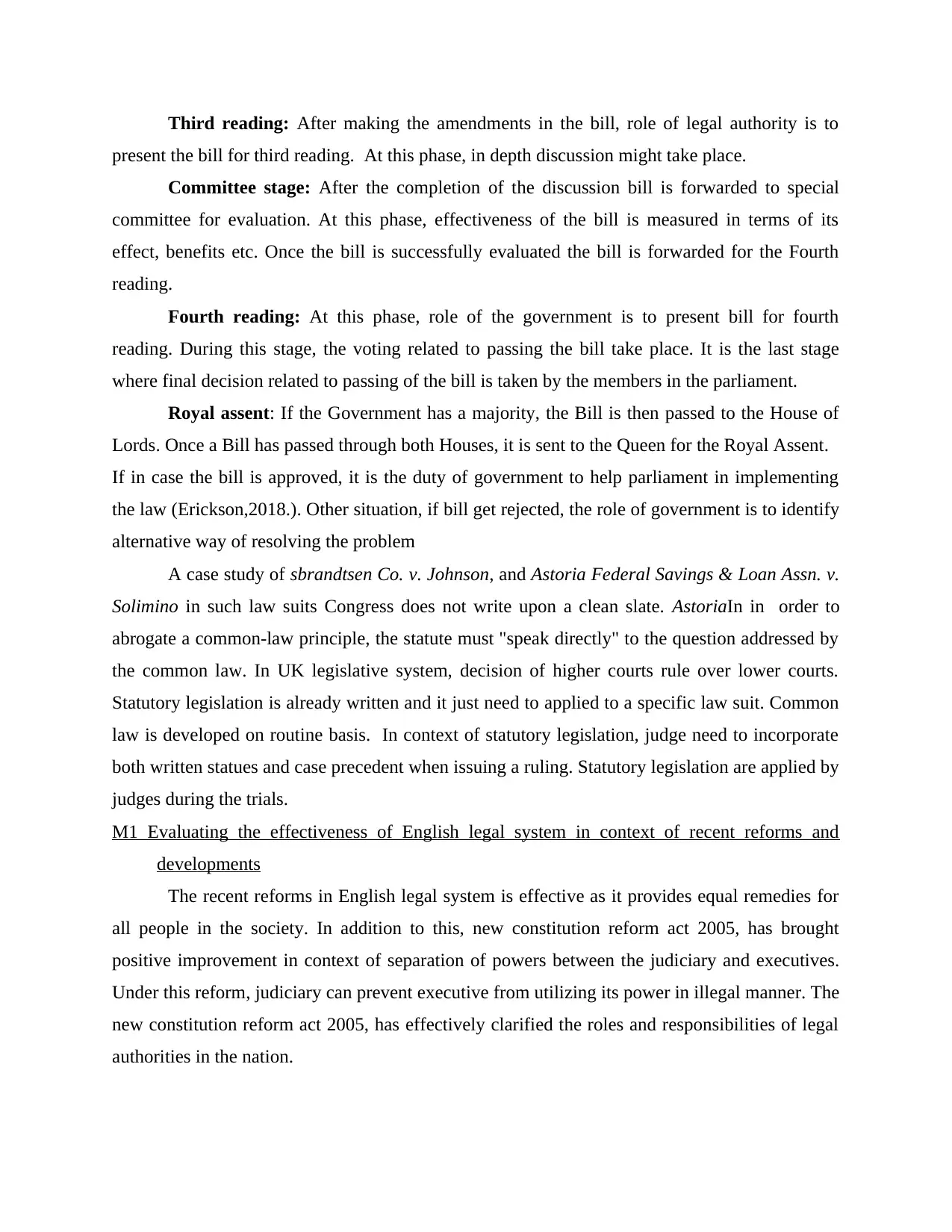
Third reading: After making the amendments in the bill, role of legal authority is to
present the bill for third reading. At this phase, in depth discussion might take place.
Committee stage: After the completion of the discussion bill is forwarded to special
committee for evaluation. At this phase, effectiveness of the bill is measured in terms of its
effect, benefits etc. Once the bill is successfully evaluated the bill is forwarded for the Fourth
reading.
Fourth reading: At this phase, role of the government is to present bill for fourth
reading. During this stage, the voting related to passing the bill take place. It is the last stage
where final decision related to passing of the bill is taken by the members in the parliament.
Royal assent: If the Government has a majority, the Bill is then passed to the House of
Lords. Once a Bill has passed through both Houses, it is sent to the Queen for the Royal Assent.
If in case the bill is approved, it is the duty of government to help parliament in implementing
the law (Erickson,2018.). Other situation, if bill get rejected, the role of government is to identify
alternative way of resolving the problem
A case study of sbrandtsen Co. v. Johnson, and Astoria Federal Savings & Loan Assn. v.
Solimino in such law suits Congress does not write upon a clean slate. AstoriaIn in order to
abrogate a common-law principle, the statute must "speak directly" to the question addressed by
the common law. In UK legislative system, decision of higher courts rule over lower courts.
Statutory legislation is already written and it just need to applied to a specific law suit. Common
law is developed on routine basis. In context of statutory legislation, judge need to incorporate
both written statues and case precedent when issuing a ruling. Statutory legislation are applied by
judges during the trials.
M1 Evaluating the effectiveness of English legal system in context of recent reforms and
developments
The recent reforms in English legal system is effective as it provides equal remedies for
all people in the society. In addition to this, new constitution reform act 2005, has brought
positive improvement in context of separation of powers between the judiciary and executives.
Under this reform, judiciary can prevent executive from utilizing its power in illegal manner. The
new constitution reform act 2005, has effectively clarified the roles and responsibilities of legal
authorities in the nation.
present the bill for third reading. At this phase, in depth discussion might take place.
Committee stage: After the completion of the discussion bill is forwarded to special
committee for evaluation. At this phase, effectiveness of the bill is measured in terms of its
effect, benefits etc. Once the bill is successfully evaluated the bill is forwarded for the Fourth
reading.
Fourth reading: At this phase, role of the government is to present bill for fourth
reading. During this stage, the voting related to passing the bill take place. It is the last stage
where final decision related to passing of the bill is taken by the members in the parliament.
Royal assent: If the Government has a majority, the Bill is then passed to the House of
Lords. Once a Bill has passed through both Houses, it is sent to the Queen for the Royal Assent.
If in case the bill is approved, it is the duty of government to help parliament in implementing
the law (Erickson,2018.). Other situation, if bill get rejected, the role of government is to identify
alternative way of resolving the problem
A case study of sbrandtsen Co. v. Johnson, and Astoria Federal Savings & Loan Assn. v.
Solimino in such law suits Congress does not write upon a clean slate. AstoriaIn in order to
abrogate a common-law principle, the statute must "speak directly" to the question addressed by
the common law. In UK legislative system, decision of higher courts rule over lower courts.
Statutory legislation is already written and it just need to applied to a specific law suit. Common
law is developed on routine basis. In context of statutory legislation, judge need to incorporate
both written statues and case precedent when issuing a ruling. Statutory legislation are applied by
judges during the trials.
M1 Evaluating the effectiveness of English legal system in context of recent reforms and
developments
The recent reforms in English legal system is effective as it provides equal remedies for
all people in the society. In addition to this, new constitution reform act 2005, has brought
positive improvement in context of separation of powers between the judiciary and executives.
Under this reform, judiciary can prevent executive from utilizing its power in illegal manner. The
new constitution reform act 2005, has effectively clarified the roles and responsibilities of legal
authorities in the nation.
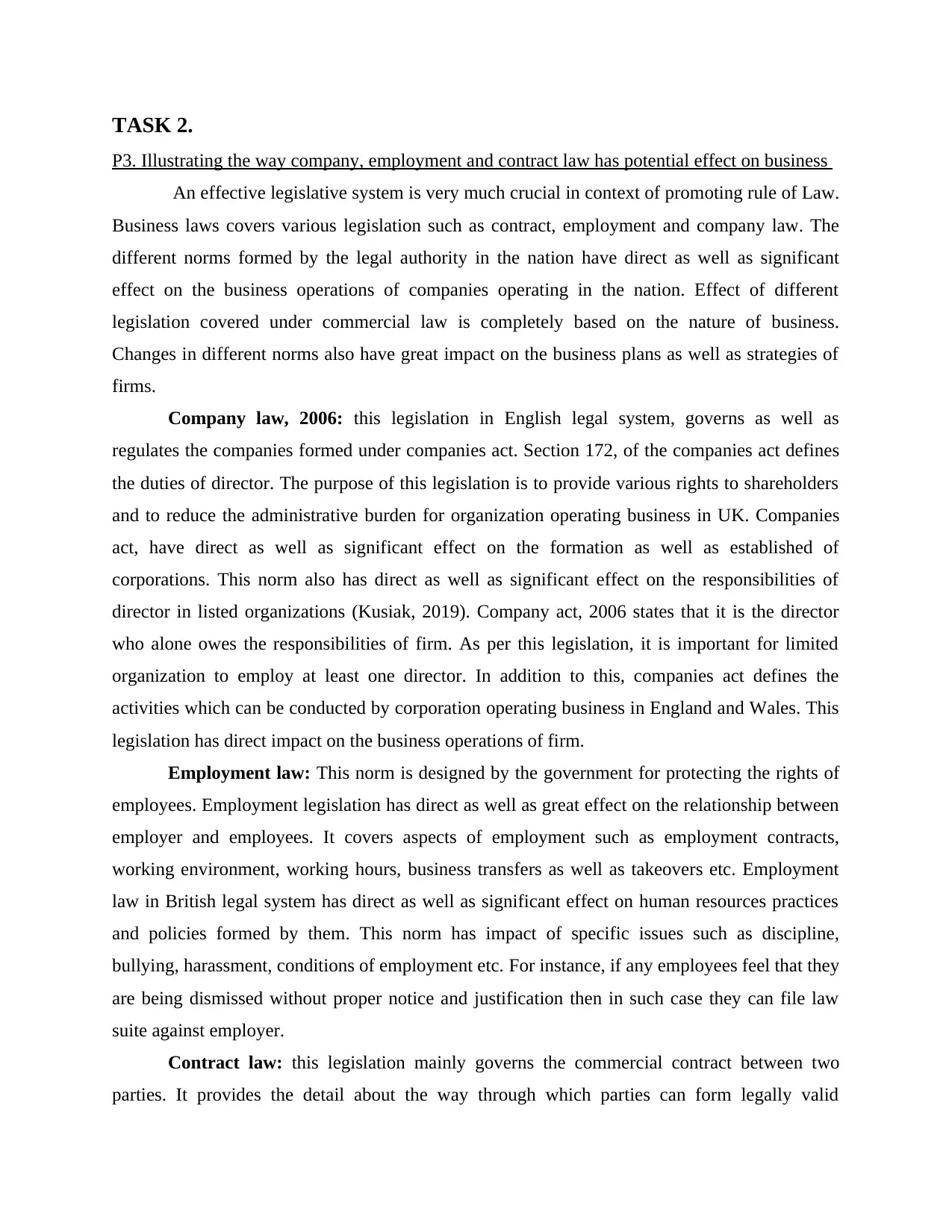
TASK 2.
P3. Illustrating the way company, employment and contract law has potential effect on business
An effective legislative system is very much crucial in context of promoting rule of Law.
Business laws covers various legislation such as contract, employment and company law. The
different norms formed by the legal authority in the nation have direct as well as significant
effect on the business operations of companies operating in the nation. Effect of different
legislation covered under commercial law is completely based on the nature of business.
Changes in different norms also have great impact on the business plans as well as strategies of
firms.
Company law, 2006: this legislation in English legal system, governs as well as
regulates the companies formed under companies act. Section 172, of the companies act defines
the duties of director. The purpose of this legislation is to provide various rights to shareholders
and to reduce the administrative burden for organization operating business in UK. Companies
act, have direct as well as significant effect on the formation as well as established of
corporations. This norm also has direct as well as significant effect on the responsibilities of
director in listed organizations (Kusiak, 2019). Company act, 2006 states that it is the director
who alone owes the responsibilities of firm. As per this legislation, it is important for limited
organization to employ at least one director. In addition to this, companies act defines the
activities which can be conducted by corporation operating business in England and Wales. This
legislation has direct impact on the business operations of firm.
Employment law: This norm is designed by the government for protecting the rights of
employees. Employment legislation has direct as well as great effect on the relationship between
employer and employees. It covers aspects of employment such as employment contracts,
working environment, working hours, business transfers as well as takeovers etc. Employment
law in British legal system has direct as well as significant effect on human resources practices
and policies formed by them. This norm has impact of specific issues such as discipline,
bullying, harassment, conditions of employment etc. For instance, if any employees feel that they
are being dismissed without proper notice and justification then in such case they can file law
suite against employer.
Contract law: this legislation mainly governs the commercial contract between two
parties. It provides the detail about the way through which parties can form legally valid
P3. Illustrating the way company, employment and contract law has potential effect on business
An effective legislative system is very much crucial in context of promoting rule of Law.
Business laws covers various legislation such as contract, employment and company law. The
different norms formed by the legal authority in the nation have direct as well as significant
effect on the business operations of companies operating in the nation. Effect of different
legislation covered under commercial law is completely based on the nature of business.
Changes in different norms also have great impact on the business plans as well as strategies of
firms.
Company law, 2006: this legislation in English legal system, governs as well as
regulates the companies formed under companies act. Section 172, of the companies act defines
the duties of director. The purpose of this legislation is to provide various rights to shareholders
and to reduce the administrative burden for organization operating business in UK. Companies
act, have direct as well as significant effect on the formation as well as established of
corporations. This norm also has direct as well as significant effect on the responsibilities of
director in listed organizations (Kusiak, 2019). Company act, 2006 states that it is the director
who alone owes the responsibilities of firm. As per this legislation, it is important for limited
organization to employ at least one director. In addition to this, companies act defines the
activities which can be conducted by corporation operating business in England and Wales. This
legislation has direct impact on the business operations of firm.
Employment law: This norm is designed by the government for protecting the rights of
employees. Employment legislation has direct as well as great effect on the relationship between
employer and employees. It covers aspects of employment such as employment contracts,
working environment, working hours, business transfers as well as takeovers etc. Employment
law in British legal system has direct as well as significant effect on human resources practices
and policies formed by them. This norm has impact of specific issues such as discipline,
bullying, harassment, conditions of employment etc. For instance, if any employees feel that they
are being dismissed without proper notice and justification then in such case they can file law
suite against employer.
Contract law: this legislation mainly governs the commercial contract between two
parties. It provides the detail about the way through which parties can form legally valid
⊘ This is a preview!⊘
Do you want full access?
Subscribe today to unlock all pages.

Trusted by 1+ million students worldwide
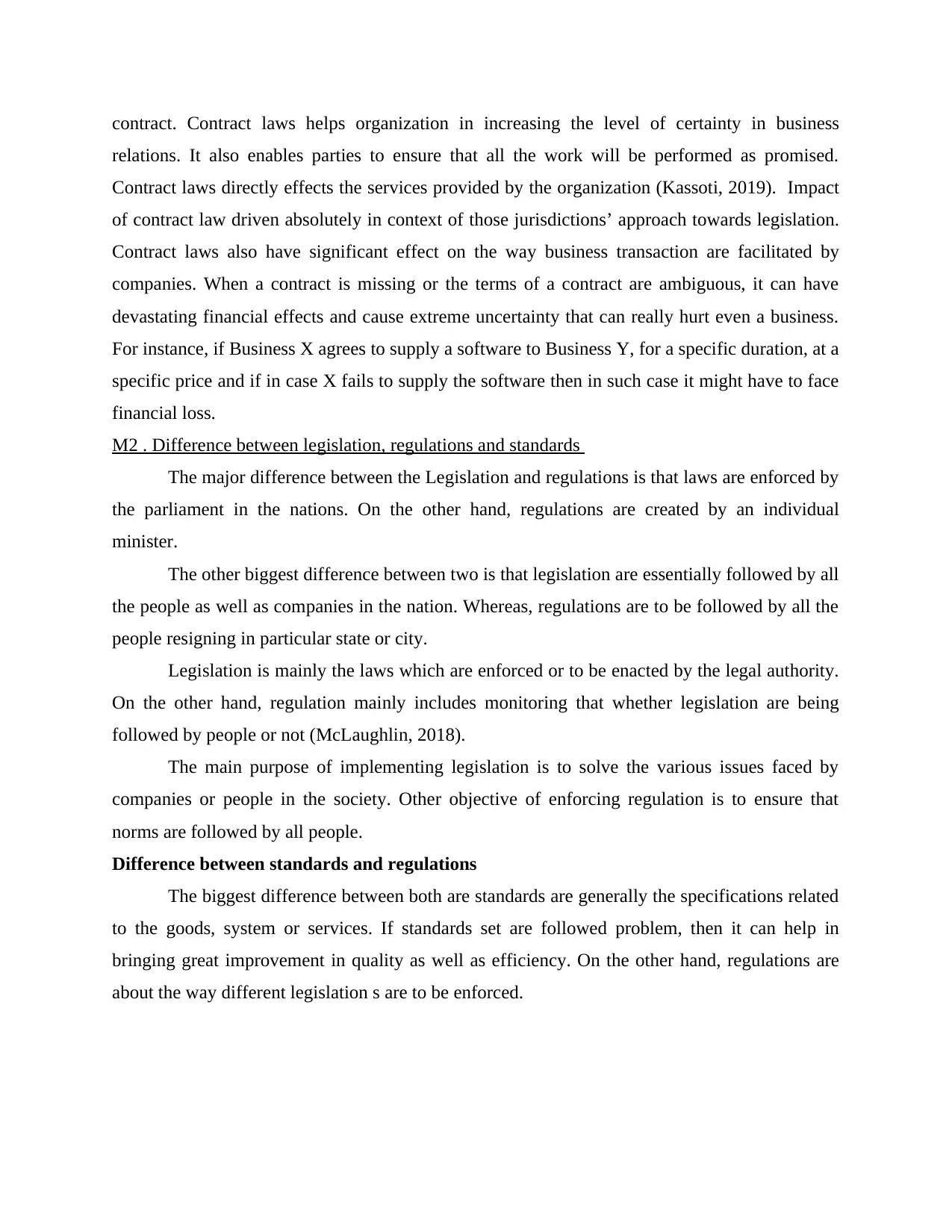
contract. Contract laws helps organization in increasing the level of certainty in business
relations. It also enables parties to ensure that all the work will be performed as promised.
Contract laws directly effects the services provided by the organization (Kassoti, 2019). Impact
of contract law driven absolutely in context of those jurisdictions’ approach towards legislation.
Contract laws also have significant effect on the way business transaction are facilitated by
companies. When a contract is missing or the terms of a contract are ambiguous, it can have
devastating financial effects and cause extreme uncertainty that can really hurt even a business.
For instance, if Business X agrees to supply a software to Business Y, for a specific duration, at a
specific price and if in case X fails to supply the software then in such case it might have to face
financial loss.
M2 . Difference between legislation, regulations and standards
The major difference between the Legislation and regulations is that laws are enforced by
the parliament in the nations. On the other hand, regulations are created by an individual
minister.
The other biggest difference between two is that legislation are essentially followed by all
the people as well as companies in the nation. Whereas, regulations are to be followed by all the
people resigning in particular state or city.
Legislation is mainly the laws which are enforced or to be enacted by the legal authority.
On the other hand, regulation mainly includes monitoring that whether legislation are being
followed by people or not (McLaughlin, 2018).
The main purpose of implementing legislation is to solve the various issues faced by
companies or people in the society. Other objective of enforcing regulation is to ensure that
norms are followed by all people.
Difference between standards and regulations
The biggest difference between both are standards are generally the specifications related
to the goods, system or services. If standards set are followed problem, then it can help in
bringing great improvement in quality as well as efficiency. On the other hand, regulations are
about the way different legislation s are to be enforced.
relations. It also enables parties to ensure that all the work will be performed as promised.
Contract laws directly effects the services provided by the organization (Kassoti, 2019). Impact
of contract law driven absolutely in context of those jurisdictions’ approach towards legislation.
Contract laws also have significant effect on the way business transaction are facilitated by
companies. When a contract is missing or the terms of a contract are ambiguous, it can have
devastating financial effects and cause extreme uncertainty that can really hurt even a business.
For instance, if Business X agrees to supply a software to Business Y, for a specific duration, at a
specific price and if in case X fails to supply the software then in such case it might have to face
financial loss.
M2 . Difference between legislation, regulations and standards
The major difference between the Legislation and regulations is that laws are enforced by
the parliament in the nations. On the other hand, regulations are created by an individual
minister.
The other biggest difference between two is that legislation are essentially followed by all
the people as well as companies in the nation. Whereas, regulations are to be followed by all the
people resigning in particular state or city.
Legislation is mainly the laws which are enforced or to be enacted by the legal authority.
On the other hand, regulation mainly includes monitoring that whether legislation are being
followed by people or not (McLaughlin, 2018).
The main purpose of implementing legislation is to solve the various issues faced by
companies or people in the society. Other objective of enforcing regulation is to ensure that
norms are followed by all people.
Difference between standards and regulations
The biggest difference between both are standards are generally the specifications related
to the goods, system or services. If standards set are followed problem, then it can help in
bringing great improvement in quality as well as efficiency. On the other hand, regulations are
about the way different legislation s are to be enforced.
Paraphrase This Document
Need a fresh take? Get an instant paraphrase of this document with our AI Paraphraser
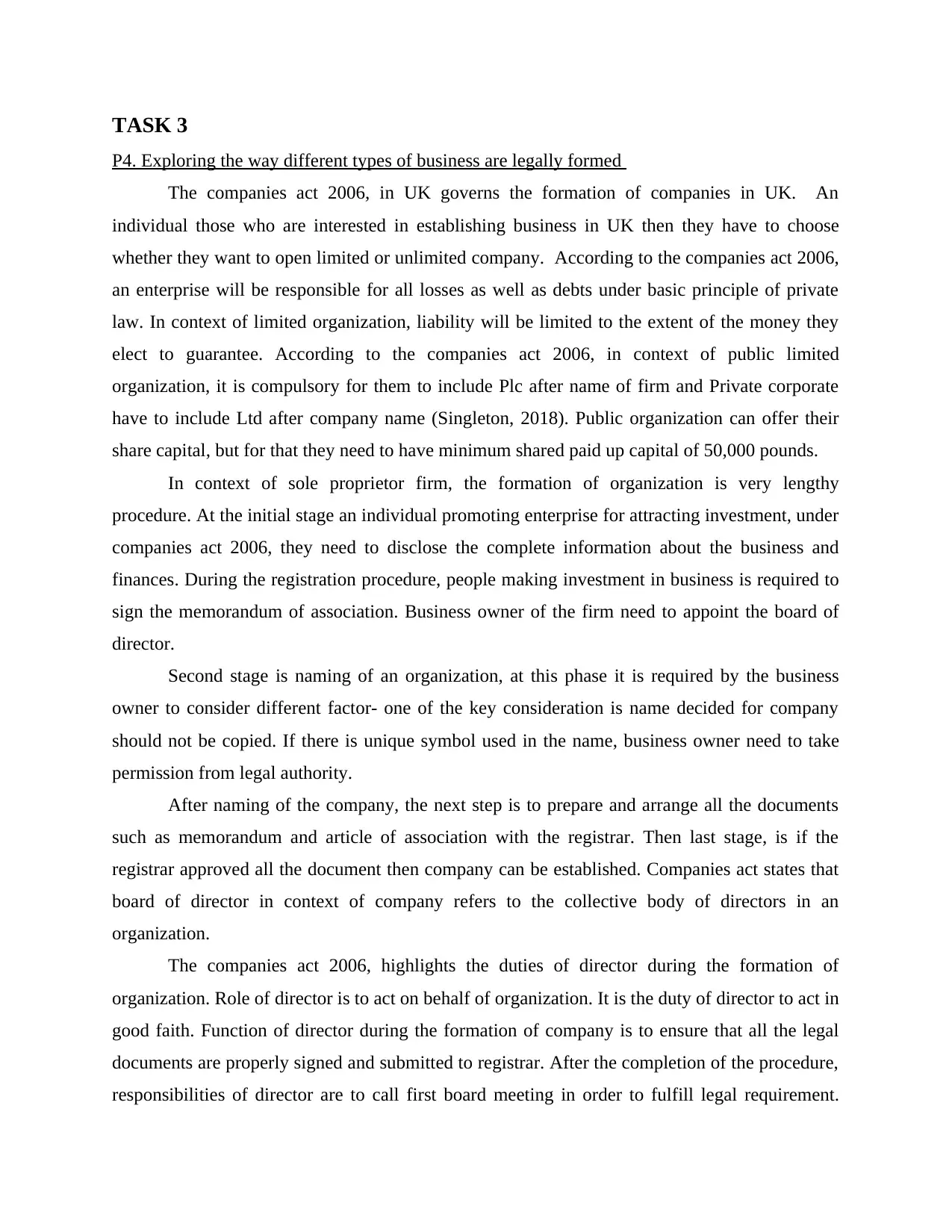
TASK 3
P4. Exploring the way different types of business are legally formed
The companies act 2006, in UK governs the formation of companies in UK. An
individual those who are interested in establishing business in UK then they have to choose
whether they want to open limited or unlimited company. According to the companies act 2006,
an enterprise will be responsible for all losses as well as debts under basic principle of private
law. In context of limited organization, liability will be limited to the extent of the money they
elect to guarantee. According to the companies act 2006, in context of public limited
organization, it is compulsory for them to include Plc after name of firm and Private corporate
have to include Ltd after company name (Singleton, 2018). Public organization can offer their
share capital, but for that they need to have minimum shared paid up capital of 50,000 pounds.
In context of sole proprietor firm, the formation of organization is very lengthy
procedure. At the initial stage an individual promoting enterprise for attracting investment, under
companies act 2006, they need to disclose the complete information about the business and
finances. During the registration procedure, people making investment in business is required to
sign the memorandum of association. Business owner of the firm need to appoint the board of
director.
Second stage is naming of an organization, at this phase it is required by the business
owner to consider different factor- one of the key consideration is name decided for company
should not be copied. If there is unique symbol used in the name, business owner need to take
permission from legal authority.
After naming of the company, the next step is to prepare and arrange all the documents
such as memorandum and article of association with the registrar. Then last stage, is if the
registrar approved all the document then company can be established. Companies act states that
board of director in context of company refers to the collective body of directors in an
organization.
The companies act 2006, highlights the duties of director during the formation of
organization. Role of director is to act on behalf of organization. It is the duty of director to act in
good faith. Function of director during the formation of company is to ensure that all the legal
documents are properly signed and submitted to registrar. After the completion of the procedure,
responsibilities of director are to call first board meeting in order to fulfill legal requirement.
P4. Exploring the way different types of business are legally formed
The companies act 2006, in UK governs the formation of companies in UK. An
individual those who are interested in establishing business in UK then they have to choose
whether they want to open limited or unlimited company. According to the companies act 2006,
an enterprise will be responsible for all losses as well as debts under basic principle of private
law. In context of limited organization, liability will be limited to the extent of the money they
elect to guarantee. According to the companies act 2006, in context of public limited
organization, it is compulsory for them to include Plc after name of firm and Private corporate
have to include Ltd after company name (Singleton, 2018). Public organization can offer their
share capital, but for that they need to have minimum shared paid up capital of 50,000 pounds.
In context of sole proprietor firm, the formation of organization is very lengthy
procedure. At the initial stage an individual promoting enterprise for attracting investment, under
companies act 2006, they need to disclose the complete information about the business and
finances. During the registration procedure, people making investment in business is required to
sign the memorandum of association. Business owner of the firm need to appoint the board of
director.
Second stage is naming of an organization, at this phase it is required by the business
owner to consider different factor- one of the key consideration is name decided for company
should not be copied. If there is unique symbol used in the name, business owner need to take
permission from legal authority.
After naming of the company, the next step is to prepare and arrange all the documents
such as memorandum and article of association with the registrar. Then last stage, is if the
registrar approved all the document then company can be established. Companies act states that
board of director in context of company refers to the collective body of directors in an
organization.
The companies act 2006, highlights the duties of director during the formation of
organization. Role of director is to act on behalf of organization. It is the duty of director to act in
good faith. Function of director during the formation of company is to ensure that all the legal
documents are properly signed and submitted to registrar. After the completion of the procedure,
responsibilities of director are to call first board meeting in order to fulfill legal requirement.
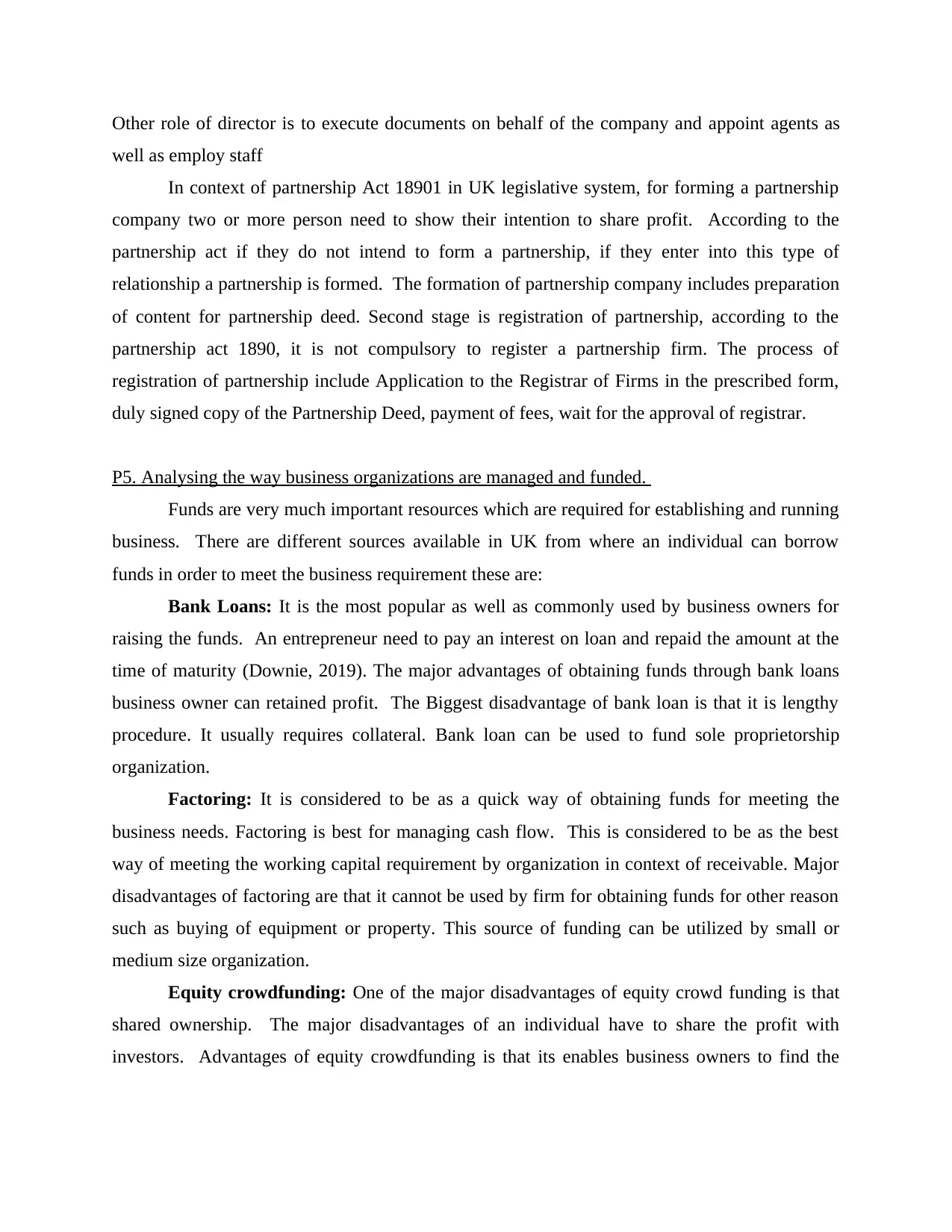
Other role of director is to execute documents on behalf of the company and appoint agents as
well as employ staff
In context of partnership Act 18901 in UK legislative system, for forming a partnership
company two or more person need to show their intention to share profit. According to the
partnership act if they do not intend to form a partnership, if they enter into this type of
relationship a partnership is formed. The formation of partnership company includes preparation
of content for partnership deed. Second stage is registration of partnership, according to the
partnership act 1890, it is not compulsory to register a partnership firm. The process of
registration of partnership include Application to the Registrar of Firms in the prescribed form,
duly signed copy of the Partnership Deed, payment of fees, wait for the approval of registrar.
P5. Analysing the way business organizations are managed and funded.
Funds are very much important resources which are required for establishing and running
business. There are different sources available in UK from where an individual can borrow
funds in order to meet the business requirement these are:
Bank Loans: It is the most popular as well as commonly used by business owners for
raising the funds. An entrepreneur need to pay an interest on loan and repaid the amount at the
time of maturity (Downie, 2019). The major advantages of obtaining funds through bank loans
business owner can retained profit. The Biggest disadvantage of bank loan is that it is lengthy
procedure. It usually requires collateral. Bank loan can be used to fund sole proprietorship
organization.
Factoring: It is considered to be as a quick way of obtaining funds for meeting the
business needs. Factoring is best for managing cash flow. This is considered to be as the best
way of meeting the working capital requirement by organization in context of receivable. Major
disadvantages of factoring are that it cannot be used by firm for obtaining funds for other reason
such as buying of equipment or property. This source of funding can be utilized by small or
medium size organization.
Equity crowdfunding: One of the major disadvantages of equity crowd funding is that
shared ownership. The major disadvantages of an individual have to share the profit with
investors. Advantages of equity crowdfunding is that its enables business owners to find the
well as employ staff
In context of partnership Act 18901 in UK legislative system, for forming a partnership
company two or more person need to show their intention to share profit. According to the
partnership act if they do not intend to form a partnership, if they enter into this type of
relationship a partnership is formed. The formation of partnership company includes preparation
of content for partnership deed. Second stage is registration of partnership, according to the
partnership act 1890, it is not compulsory to register a partnership firm. The process of
registration of partnership include Application to the Registrar of Firms in the prescribed form,
duly signed copy of the Partnership Deed, payment of fees, wait for the approval of registrar.
P5. Analysing the way business organizations are managed and funded.
Funds are very much important resources which are required for establishing and running
business. There are different sources available in UK from where an individual can borrow
funds in order to meet the business requirement these are:
Bank Loans: It is the most popular as well as commonly used by business owners for
raising the funds. An entrepreneur need to pay an interest on loan and repaid the amount at the
time of maturity (Downie, 2019). The major advantages of obtaining funds through bank loans
business owner can retained profit. The Biggest disadvantage of bank loan is that it is lengthy
procedure. It usually requires collateral. Bank loan can be used to fund sole proprietorship
organization.
Factoring: It is considered to be as a quick way of obtaining funds for meeting the
business needs. Factoring is best for managing cash flow. This is considered to be as the best
way of meeting the working capital requirement by organization in context of receivable. Major
disadvantages of factoring are that it cannot be used by firm for obtaining funds for other reason
such as buying of equipment or property. This source of funding can be utilized by small or
medium size organization.
Equity crowdfunding: One of the major disadvantages of equity crowd funding is that
shared ownership. The major disadvantages of an individual have to share the profit with
investors. Advantages of equity crowdfunding is that its enables business owners to find the
⊘ This is a preview!⊘
Do you want full access?
Subscribe today to unlock all pages.

Trusted by 1+ million students worldwide
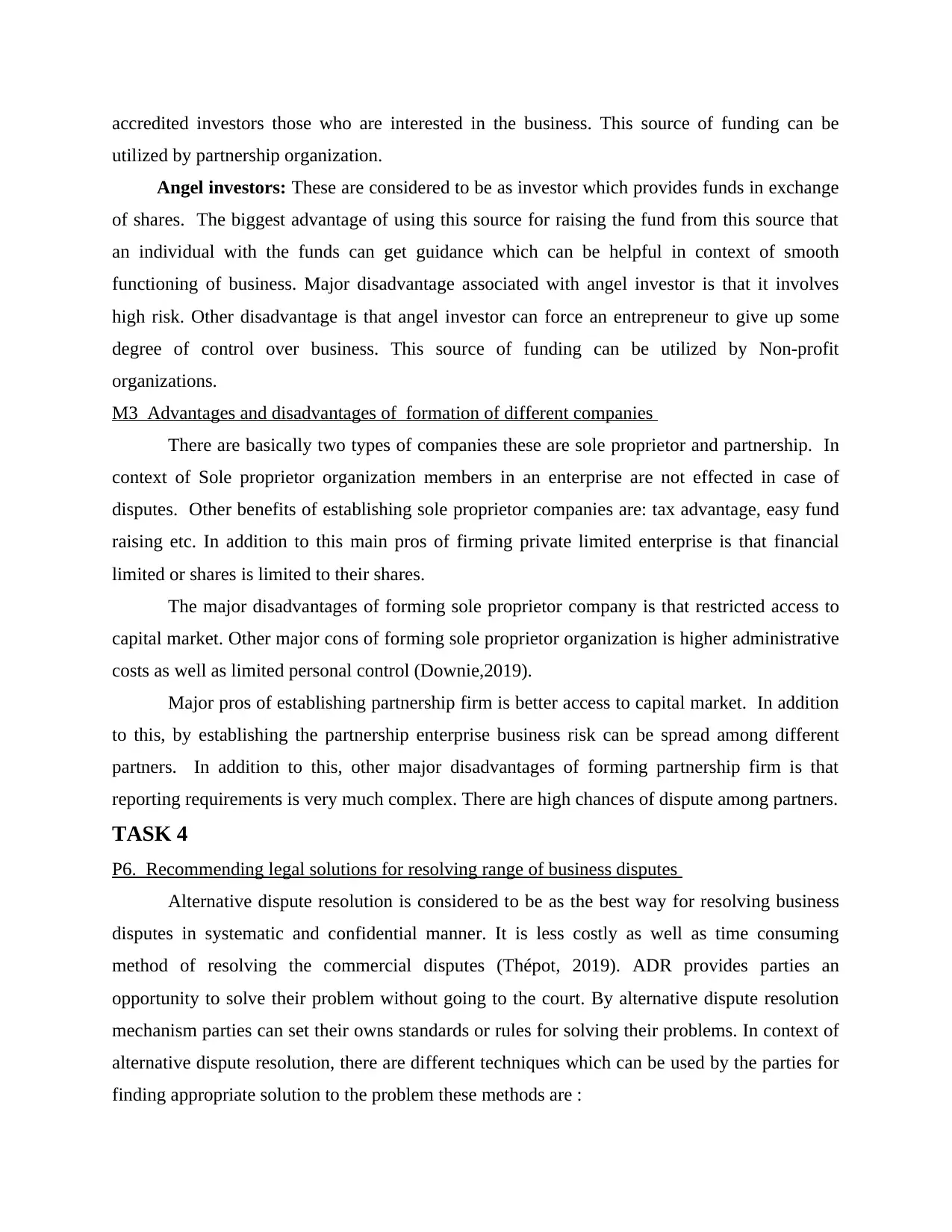
accredited investors those who are interested in the business. This source of funding can be
utilized by partnership organization.
Angel investors: These are considered to be as investor which provides funds in exchange
of shares. The biggest advantage of using this source for raising the fund from this source that
an individual with the funds can get guidance which can be helpful in context of smooth
functioning of business. Major disadvantage associated with angel investor is that it involves
high risk. Other disadvantage is that angel investor can force an entrepreneur to give up some
degree of control over business. This source of funding can be utilized by Non-profit
organizations.
M3 Advantages and disadvantages of formation of different companies
There are basically two types of companies these are sole proprietor and partnership. In
context of Sole proprietor organization members in an enterprise are not effected in case of
disputes. Other benefits of establishing sole proprietor companies are: tax advantage, easy fund
raising etc. In addition to this main pros of firming private limited enterprise is that financial
limited or shares is limited to their shares.
The major disadvantages of forming sole proprietor company is that restricted access to
capital market. Other major cons of forming sole proprietor organization is higher administrative
costs as well as limited personal control (Downie,2019).
Major pros of establishing partnership firm is better access to capital market. In addition
to this, by establishing the partnership enterprise business risk can be spread among different
partners. In addition to this, other major disadvantages of forming partnership firm is that
reporting requirements is very much complex. There are high chances of dispute among partners.
TASK 4
P6. Recommending legal solutions for resolving range of business disputes
Alternative dispute resolution is considered to be as the best way for resolving business
disputes in systematic and confidential manner. It is less costly as well as time consuming
method of resolving the commercial disputes (Thépot, 2019). ADR provides parties an
opportunity to solve their problem without going to the court. By alternative dispute resolution
mechanism parties can set their owns standards or rules for solving their problems. In context of
alternative dispute resolution, there are different techniques which can be used by the parties for
finding appropriate solution to the problem these methods are :
utilized by partnership organization.
Angel investors: These are considered to be as investor which provides funds in exchange
of shares. The biggest advantage of using this source for raising the fund from this source that
an individual with the funds can get guidance which can be helpful in context of smooth
functioning of business. Major disadvantage associated with angel investor is that it involves
high risk. Other disadvantage is that angel investor can force an entrepreneur to give up some
degree of control over business. This source of funding can be utilized by Non-profit
organizations.
M3 Advantages and disadvantages of formation of different companies
There are basically two types of companies these are sole proprietor and partnership. In
context of Sole proprietor organization members in an enterprise are not effected in case of
disputes. Other benefits of establishing sole proprietor companies are: tax advantage, easy fund
raising etc. In addition to this main pros of firming private limited enterprise is that financial
limited or shares is limited to their shares.
The major disadvantages of forming sole proprietor company is that restricted access to
capital market. Other major cons of forming sole proprietor organization is higher administrative
costs as well as limited personal control (Downie,2019).
Major pros of establishing partnership firm is better access to capital market. In addition
to this, by establishing the partnership enterprise business risk can be spread among different
partners. In addition to this, other major disadvantages of forming partnership firm is that
reporting requirements is very much complex. There are high chances of dispute among partners.
TASK 4
P6. Recommending legal solutions for resolving range of business disputes
Alternative dispute resolution is considered to be as the best way for resolving business
disputes in systematic and confidential manner. It is less costly as well as time consuming
method of resolving the commercial disputes (Thépot, 2019). ADR provides parties an
opportunity to solve their problem without going to the court. By alternative dispute resolution
mechanism parties can set their owns standards or rules for solving their problems. In context of
alternative dispute resolution, there are different techniques which can be used by the parties for
finding appropriate solution to the problem these methods are :
Paraphrase This Document
Need a fresh take? Get an instant paraphrase of this document with our AI Paraphraser
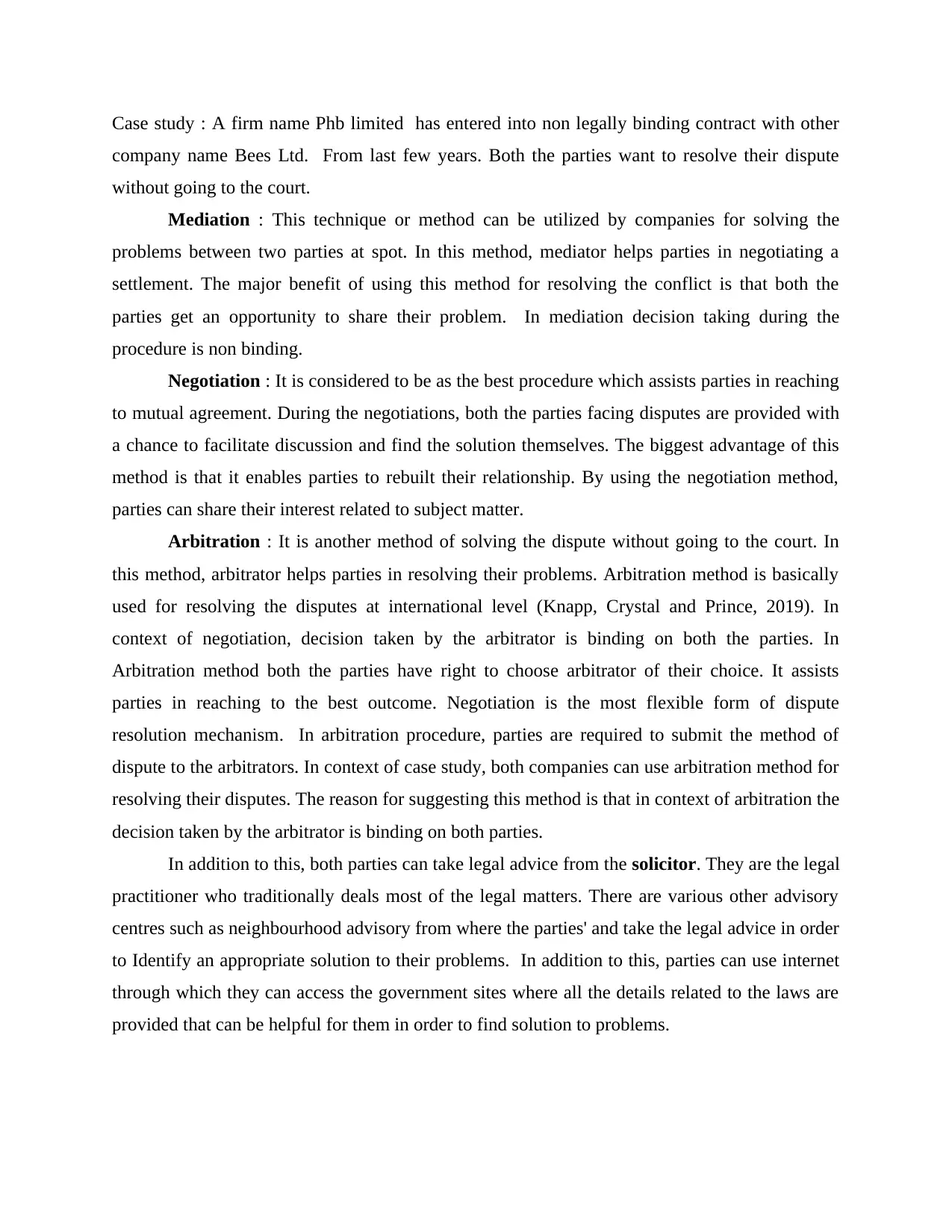
Case study : A firm name Phb limited has entered into non legally binding contract with other
company name Bees Ltd. From last few years. Both the parties want to resolve their dispute
without going to the court.
Mediation : This technique or method can be utilized by companies for solving the
problems between two parties at spot. In this method, mediator helps parties in negotiating a
settlement. The major benefit of using this method for resolving the conflict is that both the
parties get an opportunity to share their problem. In mediation decision taking during the
procedure is non binding.
Negotiation : It is considered to be as the best procedure which assists parties in reaching
to mutual agreement. During the negotiations, both the parties facing disputes are provided with
a chance to facilitate discussion and find the solution themselves. The biggest advantage of this
method is that it enables parties to rebuilt their relationship. By using the negotiation method,
parties can share their interest related to subject matter.
Arbitration : It is another method of solving the dispute without going to the court. In
this method, arbitrator helps parties in resolving their problems. Arbitration method is basically
used for resolving the disputes at international level (Knapp, Crystal and Prince, 2019). In
context of negotiation, decision taken by the arbitrator is binding on both the parties. In
Arbitration method both the parties have right to choose arbitrator of their choice. It assists
parties in reaching to the best outcome. Negotiation is the most flexible form of dispute
resolution mechanism. In arbitration procedure, parties are required to submit the method of
dispute to the arbitrators. In context of case study, both companies can use arbitration method for
resolving their disputes. The reason for suggesting this method is that in context of arbitration the
decision taken by the arbitrator is binding on both parties.
In addition to this, both parties can take legal advice from the solicitor. They are the legal
practitioner who traditionally deals most of the legal matters. There are various other advisory
centres such as neighbourhood advisory from where the parties' and take the legal advice in order
to Identify an appropriate solution to their problems. In addition to this, parties can use internet
through which they can access the government sites where all the details related to the laws are
provided that can be helpful for them in order to find solution to problems.
company name Bees Ltd. From last few years. Both the parties want to resolve their dispute
without going to the court.
Mediation : This technique or method can be utilized by companies for solving the
problems between two parties at spot. In this method, mediator helps parties in negotiating a
settlement. The major benefit of using this method for resolving the conflict is that both the
parties get an opportunity to share their problem. In mediation decision taking during the
procedure is non binding.
Negotiation : It is considered to be as the best procedure which assists parties in reaching
to mutual agreement. During the negotiations, both the parties facing disputes are provided with
a chance to facilitate discussion and find the solution themselves. The biggest advantage of this
method is that it enables parties to rebuilt their relationship. By using the negotiation method,
parties can share their interest related to subject matter.
Arbitration : It is another method of solving the dispute without going to the court. In
this method, arbitrator helps parties in resolving their problems. Arbitration method is basically
used for resolving the disputes at international level (Knapp, Crystal and Prince, 2019). In
context of negotiation, decision taken by the arbitrator is binding on both the parties. In
Arbitration method both the parties have right to choose arbitrator of their choice. It assists
parties in reaching to the best outcome. Negotiation is the most flexible form of dispute
resolution mechanism. In arbitration procedure, parties are required to submit the method of
dispute to the arbitrators. In context of case study, both companies can use arbitration method for
resolving their disputes. The reason for suggesting this method is that in context of arbitration the
decision taken by the arbitrator is binding on both parties.
In addition to this, both parties can take legal advice from the solicitor. They are the legal
practitioner who traditionally deals most of the legal matters. There are various other advisory
centres such as neighbourhood advisory from where the parties' and take the legal advice in order
to Identify an appropriate solution to their problems. In addition to this, parties can use internet
through which they can access the government sites where all the details related to the laws are
provided that can be helpful for them in order to find solution to problems.
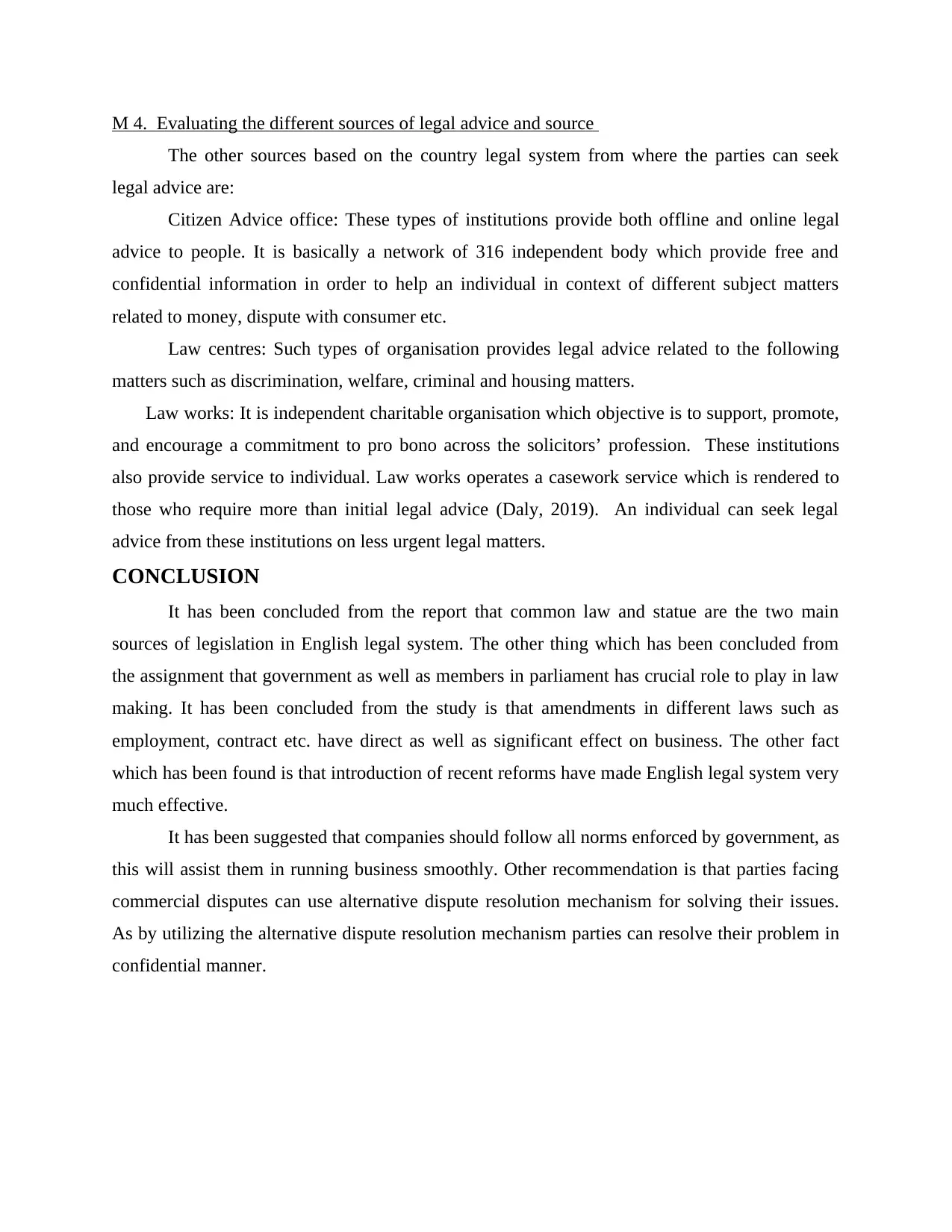
M 4. Evaluating the different sources of legal advice and source
The other sources based on the country legal system from where the parties can seek
legal advice are:
Citizen Advice office: These types of institutions provide both offline and online legal
advice to people. It is basically a network of 316 independent body which provide free and
confidential information in order to help an individual in context of different subject matters
related to money, dispute with consumer etc.
Law centres: Such types of organisation provides legal advice related to the following
matters such as discrimination, welfare, criminal and housing matters.
Law works: It is independent charitable organisation which objective is to support, promote,
and encourage a commitment to pro bono across the solicitors’ profession. These institutions
also provide service to individual. Law works operates a casework service which is rendered to
those who require more than initial legal advice (Daly, 2019). An individual can seek legal
advice from these institutions on less urgent legal matters.
CONCLUSION
It has been concluded from the report that common law and statue are the two main
sources of legislation in English legal system. The other thing which has been concluded from
the assignment that government as well as members in parliament has crucial role to play in law
making. It has been concluded from the study is that amendments in different laws such as
employment, contract etc. have direct as well as significant effect on business. The other fact
which has been found is that introduction of recent reforms have made English legal system very
much effective.
It has been suggested that companies should follow all norms enforced by government, as
this will assist them in running business smoothly. Other recommendation is that parties facing
commercial disputes can use alternative dispute resolution mechanism for solving their issues.
As by utilizing the alternative dispute resolution mechanism parties can resolve their problem in
confidential manner.
The other sources based on the country legal system from where the parties can seek
legal advice are:
Citizen Advice office: These types of institutions provide both offline and online legal
advice to people. It is basically a network of 316 independent body which provide free and
confidential information in order to help an individual in context of different subject matters
related to money, dispute with consumer etc.
Law centres: Such types of organisation provides legal advice related to the following
matters such as discrimination, welfare, criminal and housing matters.
Law works: It is independent charitable organisation which objective is to support, promote,
and encourage a commitment to pro bono across the solicitors’ profession. These institutions
also provide service to individual. Law works operates a casework service which is rendered to
those who require more than initial legal advice (Daly, 2019). An individual can seek legal
advice from these institutions on less urgent legal matters.
CONCLUSION
It has been concluded from the report that common law and statue are the two main
sources of legislation in English legal system. The other thing which has been concluded from
the assignment that government as well as members in parliament has crucial role to play in law
making. It has been concluded from the study is that amendments in different laws such as
employment, contract etc. have direct as well as significant effect on business. The other fact
which has been found is that introduction of recent reforms have made English legal system very
much effective.
It has been suggested that companies should follow all norms enforced by government, as
this will assist them in running business smoothly. Other recommendation is that parties facing
commercial disputes can use alternative dispute resolution mechanism for solving their issues.
As by utilizing the alternative dispute resolution mechanism parties can resolve their problem in
confidential manner.
⊘ This is a preview!⊘
Do you want full access?
Subscribe today to unlock all pages.

Trusted by 1+ million students worldwide
1 out of 15
Related Documents
Your All-in-One AI-Powered Toolkit for Academic Success.
+13062052269
info@desklib.com
Available 24*7 on WhatsApp / Email
![[object Object]](/_next/static/media/star-bottom.7253800d.svg)
Unlock your academic potential
Copyright © 2020–2025 A2Z Services. All Rights Reserved. Developed and managed by ZUCOL.





